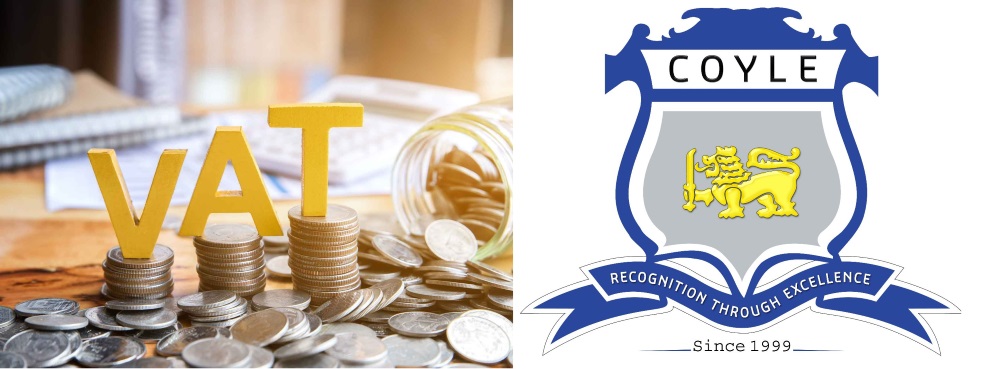
In the midst of nationwide discussions on Value-Added Tax (VAT), there’s a whirlwind of confusion stirred by political narratives, misleading media reports, and opportunistic traders. As the country grapples with economic challenges, intensifying revenue collection becomes imperative for stability and sustainable growth. The recent economic crisis, fueled partly by the erosion of the tax base, has pushed Sri Lanka’s tax-to-GDP ratio to a mere 7.3%, one of the lowest globally. The IMF’s stabilisation program aims to double this ratio to 14% by 2026, backed by evidence that countries reach a higher growth trajectory when tax revenue hits around 15% of GDP.
VAT, a flat tax on goods and services, differs from traditional sales tax. Rather than consumers paying the entire amount at the point of sale, VAT involves different parties sharing the tax burden throughout the transaction. With Sri Lanka’s standard VAT rate bumped from 15% to 18% starting January 1, 2024, it applies to imported goods, wholesale and retail trade, and various services. The filing of returns is based on specified criteria, allowing for monthly or quarterly submissions.
Unfortunately, Sri Lanka’s situation is more intricate than many others. Despite multiple requests made by the President, as well as the Governor of the Central Bank to all financial institutions, the interest rates remain exceptionally high, which sets back targets of the International Monetary Fund (IMF), who constantly stress the need for economic development in order to bolster in tax revenue. These costs are primarily inherited by not only years of poor financial management by governments but also due to recent short-term profit-motivated policies capitalised by finance institutions that are responsible for our current economic ecosystem.
The government finds itself in a delicate balancing act. While compelled to increase revenue through taxation, there’s a looming concern about the potential contraction of the economy when taxes are raised. This challenges our goal of fostering growth, as heightened taxes lead to reduced purchasing power for individuals. A contracting economy, in turn, potentially initiates a decline in tax revenue.
Revised VAT Exemptions:
Despite the VAT increase, certain essential items remain exempt, providing relief to citizens. Crucial exemptions include staples like wheat, wheat flour, rice, rice flour, bread, and infant milk powder. Healthcare services, medications, locally manufactured surgical items, Ayurvedic preparations, and more stay VAT-free, except for hospital room charges. Financial services, import duty waivers, exports, education, and public transportation continue to be exempt or zero-rated. These changes aim to optimise VAT collections while safeguarding low-income groups.
Key Highlights of Revised VAT Exemptions:
- Essential food items like wheat, wheat flour, and infant milk powder remain VAT-exempt.
- Healthcare services and medications continue to be VAT-free, excluding hospital room charges.
- Financial services, including bank accounts and insurance, retain their exemption.
- Import duty waivers persist for specific products.
- Exports, education, and public transportation continue to be zero-rated.
To navigate this VAT landscape effectively, relevant authorities must educate the public proactively. People can be misled, and misinformation spreads easily. People must be aware of the truth. One such truth is that pharmaceuticals and drugs (medicines) are exempt from VAT. However, a lack of awareness leaves room for exploitation by traders.
Evasion and tax avoidance are some of the first obstacles that must be removed as Sri Lanka enters this new tax climate. Essentially, the government needs to evoke faith and trust amongst the public that the tax money is spent for the benefit of the people. We, as COYLE, identify two major concerns restricting the public’s support of the recent VAT hike in Sri Lanka. Firstly, there is a call for transparency in the utilisation of public funds. All past governments and their officials have burdened the country by resorting to redundant hiring policies to earn votes, which have resulted in a highly inefficient public sector. As an election year is nearing, the public fears similar mismanagement of funds will occur when opportunity permits, derailing the VAT collection efforts and the country’s revival plan.
Secondly, the irresponsible behaviour of government officials, which led to the financial crisis, has left the public at great dis-taste, resulting in a reluctance to support even favourable policies. In addressing this issue, strict visibility of costs incurred in facilities provided to Members of Parliament (MPs) and their expenditures should be made public by the auditor general on a monthly basis. Steps should be implemented to visibly curtail luxury privileges, fuel quotas for multiple vehicles, over-utilisation of security forces by Members of Parliament (MPs), etc. These measures are aimed at preventing any public perception of tax misuse by the government, which has been a stain in the past and the primary deterrent to gaining the people’s confidence.
Staying informed about recent VAT changes is crucial for both traders and the public. The change begins with streamlining tax administration, directing resources to essential areas, and boosting revenue through competitive strategies. However, relying solely on a VAT increase won’t address macro instability. Ensuring overall competitiveness across the economy is key to achieving stability.
These tax regulations are vital for sustainable and inclusive growth. It’s crucial to inform the public about how their tax contributions help the country recover from the most significant financial crisis in history.



